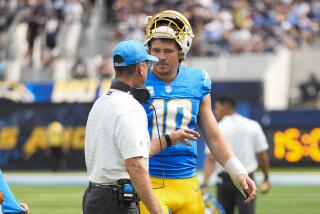In a Rare Occurrence, Words Fail Barnett
- Share via
Gary Barnett has always trusted the sound of his voice.
When you pull off what he did in 1995 at Northwestern, it’s easy to think there is no problem that cannot be worked out or simply willed your way.
On Jan. 11, 1992, Barnett stood before assembled masses in Evanston, Ill., and pronounced, “We’re going to take the Purple to Pasadena,” which was like saying, “We’re all about to board the next spaceship to Mars.”
Three years later, incredibly true to his word, Northwestern won its first Big Ten football title since the Great Depression, the Purple did go to Pasadena, and from then on Barnett has pretty much punched his own ticket despite a coaching record that stands at 77-84-2.
On Tuesday, however, what Barnett said in front of a crowd could cost him the Colorado job he has held for five seasons and worked so hard to get.
On Tuesday, in the caldron of a growing scandal Barnett thought he could control with the power of his inflection and reputation, a football coach put his foot in his mouth.
It was a rare, almost inexplicable and costly misstep.
How could a man so savvy so badly miss the point?
Katie Hnida, the female walk-on kicker Barnett inherited when he became coach in 1999, had just told Sports Illustrated’s Rick Reilly that she had been raped in 2000 by a teammate, a bombshell that transported an unseemly but largely regional story all the way to the desk of Dan Rather.
Barnett would respond, in part, that Hnida was a “terrible” player who couldn’t kick the ball through the uprights -- as if one had anything to do with the other.
Comedian Dennis Miller, mocking the convoluted logic, remarked that was like saying Laker star Kobe Bryant is not guilty of sexual assault charges because he can knock down the three-pointer.
The comments regarding Hnida led directly to Barnett’s being put on paid leave by the university and endangered his Colorado coaching future.
Barnett said his comments were taken out of context -- that he was only trying to answer a specific answer honestly.
“I apologize for answering that question in a manner where I must have come across as insensitive,” he said.
It may have been too late for Barnett, not used to playing political catch-up.
To that point, Barnett’s plan of getting out in front of the Colorado controversy had been relatively successful. He formed a calculated strategy to saturate the media with his side of the story; the idea being that candor, at least as he interpreted it, would win over hearts and minds.
Barnett’s public philosophy has always been to take things head-on; it had generally served him well.
In his autography, “High Hopes,” written in the afterglow of Northwestern’s Rose Bowl season, Barnett confessed he was a bed-wetter well into his teenage years.
Vahe Gregorian, his co-author on the book, suggested Barnett edit that part out, but Barnett refused.
“He thought it would be a useful thing and inspiring for people in that position,” Gregorian said.
Barnett has always believed in himself, believed he was right and believed you should believe it.
“He does feel if he explains it enough he can make it understandable,” Gregorian said. “But this [the Colorado story] is such a sensitive area that maybe any explanation is not going to be palatable.”
This time, Barnett’s own words became his trip wire.
Mark Kiszla, a Denver Post sports columnist, put it bluntly.
“At age 57, Barnett has never learned when it is time to shut up,” Kiszla recently wrote.
Still, it remains difficult for many to fathom Barnett’s name being attached to something with this stench.
He had a track record as a disciplinarian and a program fixer. He arrived at Colorado in 1999 on the vapor trail of former coach Rick Neuheisel, whose program had been compared with episodes of “Romper Room.”
Barnett had been accorded a certain status in his seven seasons at Northwestern, a luster that comes with turning a perennial loser into a winner with the addendum that core values at a prestigious university did not have to be compromised ... or so the story went.
With all that cachet in Barnett’s bank account, it is not surprising so many former players have rushed to defend him.
Steve Schnur, quarterback on the fairy-tale 1995 Northwestern team, said he didn’t think it was fair that Barnett was being punished for the actions of others.
“If there is criminal action going on, those people need to be held responsible, not Gary Barnett,” Schnur said. “There is just not enough personal responsibility in today’s society.”
Pat Fitzgerald, a former star linebacker under Barnett at Northwestern, issued a statement saying, “Coach Barnett is of the highest moral character. I find it hard to believe in any shape or form he would condone or harbor an environment that these allegations proclaim.”
The Mile High question remains: How could a coach who prides himself on control lose control now?
Who is the real Gary Barnett?
Is he the show-me, Missouri-raised idealist who led Northwestern from sinkhole to sensation, or a coach who got caught in the competitive zeal at Colorado and succumbed to a base coaching instinct ... winning at all cost?
You could argue it was easier to play by the rules at Northwestern because it was like playing by the rules at Stanford -- you had no choice.
Colorado was a different animal, with a different standard, and there are some who wonder whether Barnett, to stay afloat, had to lower his.
The real story with Barnett, as with most people, is murkier, more complex and shadowed in gray areas.
Before he took over Northwestern in 1992, remember, he was a longtime assistant under Bill McCartney during another scandalous period at Colorado.
Barnett was cast in warm light at Northwestern, yet some of the same questions that haunt him now haunted him then.
On his watch in Evanston, four of his players were implicated in a gambling scandal.
Dennis Lundy, a tailback, confessed to fumbling against Iowa in 1994 to make sure his team did not cover the point spread.
Barnett found out about Lundy and quickly suspended him, and took credit for stamping out a problem.
“I often wonder what would have become of the situation if it hadn’t gotten to me,” he wrote in his book. “How far would it have proceeded? Who else might have gotten involved?”
Yet, when the story came to a head in 1998, he accepted little culpability.
“What occurred here is a societal issue, not an athletic issue,” he told Associated Press. “The stain is on the individuals, not us.”
Barnett has pretty much resurrected that rebuttal for his Colorado defense.
He is a fierce competitor, one who will probably hunker down for the long, ugly haul.
No one can dispute his desire to win this battle and clear his name.
In 2002, a year after three of his players were accused (but never charged) of sexual assault at an off-campus party, Barnett looked a reporter in the eyes.
“The off-field stuff has been a war,” he said.
A war this General intended to win.
Mary Barnett, in the preface to her husband’s book, wrote, “Gary is incredibly competitive. Living with him can be looked at as a series of challenges. When we are both driving to the same destination, we will have a contest to see who arrives first.”
One year, Gary and Mary even had a contest at Thanksgiving to see who could cook the best turkey.
Moralistic, high-minded idealist or hard-driving, Type-A personality, win-at-all-recruiting-cost coach?
As he digs in for the fight of his life, there is a chance Gary Barnett may be all these things.
More to Read
Go beyond the scoreboard
Get the latest on L.A.'s teams in the daily Sports Report newsletter.
You may occasionally receive promotional content from the Los Angeles Times.










